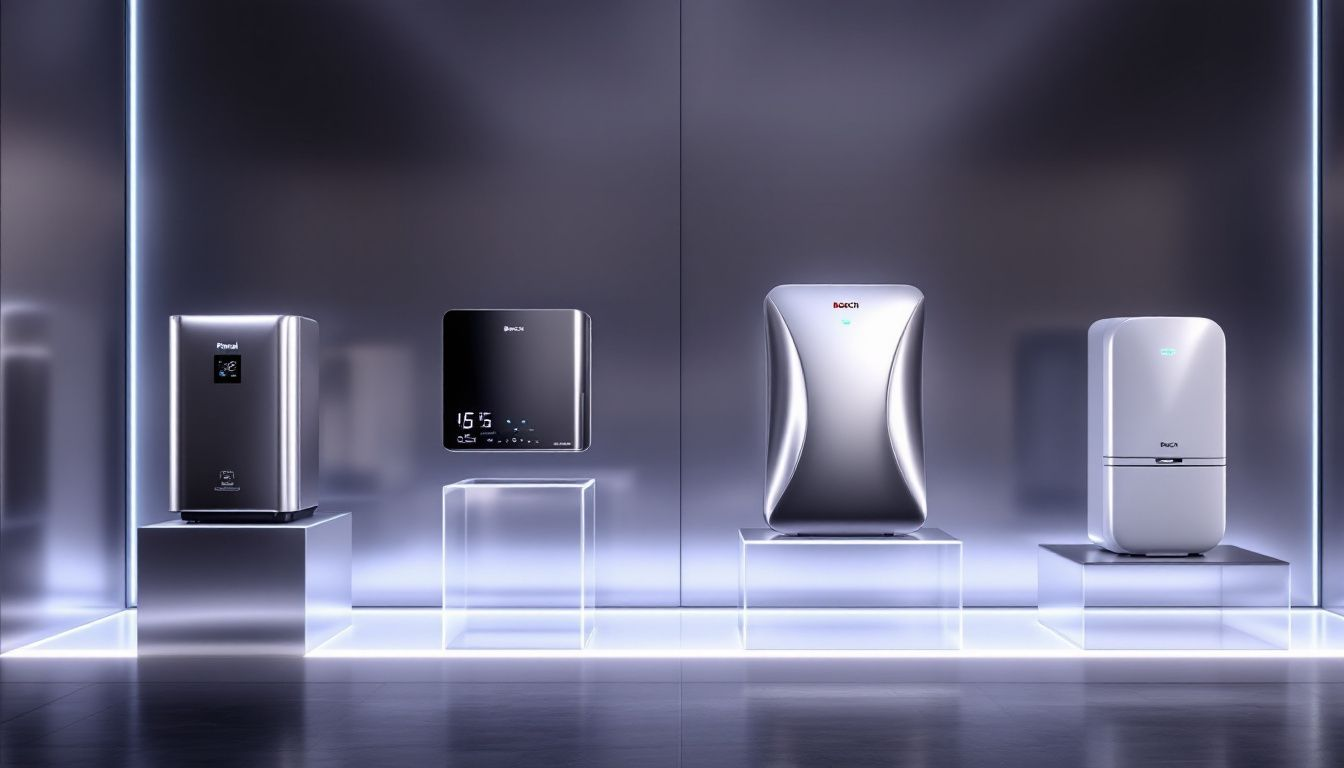The Best Tankless Water Heater: Your Ultimate Guide to Efficient Water Heating
If you’re exploring options for reliable hot water, a tankless water heater could be your answer. This article will explain what a tankless water heater is, how it works, and its benefits. We’ll cover energy efficiency, cost savings, and installation to help you decide if it’s right for your home.
Key Takeaways
Tankless water heaters provide on-demand hot water, eliminating standby heat losses and resulting in significant energy savings compared to traditional models.
Proper sizing, energy efficiency considerations, and understanding the differences between gas and electric models are crucial for choosing the right tankless water heater for your household needs.
Although tankless water heaters have higher upfront installation costs, they offer long-term savings, reduced energy bills, and longer lifespans, making them worthwhile investments.
Quick Links:
Understanding Tankless Water Heaters
Tankless water heaters, also known as on-demand or instant hot water heaters, provide hot water only when needed, without needing a storage tank. This innovative design means you’ll never run out of endless hot water again, even during peak usage. Their compact size makes them ideal for homes with limited space, fitting neatly into smaller areas where traditional water heaters could never go.
Brands like Rinnai have even integrated smart technology into their models. These heaters can learn your household’s water usage patterns and optimize hot water delivery, ensuring you have hot water exactly when needed without wasting energy.
How Tankless Water Heaters Operate
Tankless water heaters heat water directly. They do this without relying on a storage tank. Cold water flows through a pipe when a hot water faucet is turned on. It then enters the unit where a gas burner or an electric element heats the water. Gas tankless water heaters, for example, activate a gas burner to heat the water as it passes through the heat exchanger. This process ensures you get hot water almost instantly, without the wait associated with traditional water heaters.
One key advantage of tankless water heaters is their energy efficiency. Unlike conventional storage water heaters, which maintain a hot water reservoir, tankless models only heat water as needed, eliminating standby heat losses and contributing to significant energy savings. For instance, gas-condensing tankless water heaters use a secondary heat exchanger to extract even more heat from the combustion gases, further enhancing their efficiency.
Electric tankless water heaters utilize thick copper wire rods for heating. This design enables efficient water heating on demand. While they tend to be smaller and easier to install than gas models, they might struggle to meet high demand during peak usage times. Therefore, knowing your household’s hot water needs is crucial when selecting a tankless water heater.
Choosing the Right Tankless Water Heater
When choosing the right tankless hot water heater, several considerations should be made, including quality, brand, cost, and specific hot water needs. High-quality tankless water heaters can be significantly more expensive, often costing $1,000 to $3,000 more than lower-quality options. However, purchasing from a retailer instead of a plumbing company can save you up to 30%.
Consulting with a local plumber can provide valuable advice on selecting a suitable brand and model. Brands like Rinnai are highly recommended for their reliability and performance.
In addition, although solar-powered tankless water heaters are more expensive initially, they can qualify for significant tax incentives and provide long-term savings.
Condensing vs. Non-Condensing Models
Condensing tankless water heaters are designed to be more energy-efficient by utilizing exhaust heat more effectively than non-condensing models. These units trap condensation and use it to preheat the incoming cold water, which maximizes heat extraction from combustion gases. This efficient use of exhaust heat also allows for cheaper ventilation options, making condensing models potentially more cost-effective in the long run.
While non-condensing models are generally less expensive upfront, they require more complex and costly metal ventilation systems due to their higher exhaust temperatures. Therefore, while the initial investment might be lower, the long-term operational costs could be higher than condensing models.
Energy Efficiency Considerations
Energy efficiency is a crucial factor when selecting a tankless water heater. The Uniform Energy Factor (UEF) measures a water heater’s overall energy use and efficiency, directly impacting operational expenses. Tankless water heaters achieve higher efficiency by heating water on demand rather than maintaining a reserve of hot water. This can lead to energy savings of 8% to 50% compared to traditional models.
These systems can reach efficiency levels as high as 99%, significantly reducing fuel usage and environmental impact. Eliminating standby heat losses contributes to lower energy consumption and utility bills, making tankless water heaters a cost-effective choice in the long run.
Gas vs. Electric Tankless Water Heaters
Several factors include installation complexity, cost, and performance when choosing between gas and electric tankless water heaters. Gas tankless models typically provide higher flow rates, which means they can service multiple appliances simultaneously without compromising on hot water delivery. However, they come with a higher upfront cost and more complex installation requirements than electric models.
Electric tankless water heaters are generally smaller and easier to install, making them suitable for tighter spaces and homes where gas supply might be an issue. They are also typically less expensive upfront but might struggle to meet high demand during peak usage times if multiple hot water devices are used simultaneously. Therefore, the choice between tankless gas water heaters and electric models often depends on your household’s hot water needs, budget, and installation conditions. Depending on these factors, an electric water heater can be a viable option.
Gas models tend to be more efficient and can lead to lower operating costs over time. However, it’s essential to consider the long-term energy savings and performance benefits when making your decision.
Installation Options for Tankless Water Heaters
Installing a tankless water heater can be more complex than a traditional unit, but the benefits often outweigh the challenges. Proper ventilation is crucial for gas tankless water heaters to ensure harmful exhaust gases don’t accumulate indoors. Power vents require ample indoor space to supply sufficient air for heating.
Installing a new tankless water heater often requires retrofitting existing systems, upgrading electrical or gas lines, and ensuring proper ventilation. Adjustments such as ventilation piping and drainage connections might be necessary, especially for indoor installations. In warmer climates, outdoor tankless water heaters simplify installation by eliminating the need for additional venting.
Due to lower exhaust temperatures, condensing models use less expensive plastic vents, whereas non-condensing units require costlier metal vents. Direct vent systems and concentric vents offer compact installation options that reduce wall penetrations and make them suitable for tighter spaces. Complying with local building codes is also essential to avoid issues and additional costs.
Sizing Your Tankless Water Heater
Properly sizing your tankless water heater is crucial to ensure it meets your household’s hot water needs without unnecessary wear on the unit. The temperature rise, the difference between the desired hot water temperature and the incoming water temperature, is a critical factor. Residential hot water settings typically range from 120°F to 125°F, whereas commercial settings can be higher.
Determine the correct size by considering the highest flow rate and required temperature rise. Flow rate is measured in gallons per minute (GPM) and is determined by the simultaneous use of fixtures. It determines the total BTU output requirement for a household and also considers the temperature rise.
One adequately sized tankless demand water heater can generally meet the hot water needs of most households, but more considerable demands may require multiple demand water heaters. Avoid oversizing the unit, as it leads to operational inefficiencies and increased costs. The tankless water heater size is crucial for optimal performance, as it directly affects the tankless water heater’s output.
Comparing Tankless and Traditional Water Heaters
Tankless water heaters offer distinct advantages over traditional storage water heaters, particularly regarding energy efficiency. Conventional water heaters maintain a hot water reservoir, leading to standby energy losses. In contrast, tankless models heat water only when needed, eliminating these losses and resulting in significant energy savings.
Tankless heaters can be 24-34% more energy-efficient for homes with low hot water usage than traditional models. This reduces energy consumption and lowers utility bills, making tankless water heaters an attractive option for energy-conscious homeowners.
Advantages and Disadvantages of Tankless Water Heaters
Tankless water heaters provide several benefits, including on-demand hot water, so you’ll never run out of hot water when needed. Their compact and space-saving design makes them ideal for smaller homes or areas where space concerns them. Additionally, they offer significant energy savings by heating water only when required, eliminating the need for a storage tank.
However, there are some downsides to consider. The higher initial installation cost and complexity than traditional water heaters can be a barrier. Tankless water heaters also have a limited flow rate, which may not meet the hot water demands of larger households, especially during peak usage times.
While they offer energy savings and longer lifespans, the upfront costs and potential flow rate limitations must be weighed carefully.
Cost Analysis of Tankless Water Heaters
Installing a tankless water heater can vary widely, with typical installation costs averaging around $2,623 and potential prices ranging from $1,398 to $3,889. First-time installations are generally more expensive due to the need for additional electrical or gas line upgrades. Factors influencing the cost include the installation's brand, model, and complexity.
While high-end tankless water heater brands can cost up to $6,000, the average cost is approximately $2,600. Additional expenses can include permits, material costs, and labor, with labor expenses typically ranging from $600 to $1,850. Smaller electric tankless water heaters can be more affordable, with prices starting as low as $375.
Although the initial costs are higher than conventional storage types, tankless systems often lead to long-term savings, with a potential payback period of 10 to 25 years. Operating costs are generally lower over time, potentially balancing the higher initial purchase price.
Leading Brands and Models
Several brands stand out for their quality and performance when it comes to tankless water heaters. Noritz, Navien, Rinnai, Takagi, and Rheem are among the most recognized brands in the market, each offering models that cater to different needs and preferences.
Top Picks in the Market
Among the top picks, Navien tankless water heaters are known for their energy efficiency and compact size, making them suitable for various household needs. Takagi models emphasize user-friendliness and advanced safety features, ensuring reliable and safe operation. Choosing a top-performing tankless water heater is crucial for achieving long-term energy savings and optimal performance.
The combination of energy efficiency, compact design, user-friendliness, and safety features makes these models the best choices in the market. Each brand and model offers unique advantages, ensuring you can find a tankless water heater that meets your specific needs.
DIY Installation vs. Professional Services
Deciding between DIY installation and hiring professional services for your tankless water heater is an important consideration. While DIY installation can be less expensive, mistakes can lead to further damage and additional costs. Electric tankless heaters usually have a more straightforward installation process but might still require electrical system upgrades.
Though more costly, professional installation ensures the job is done correctly and complies with local building codes. Careful consideration of costs, potential mistakes, and the complexity of the installation is essential when making this decision.
Maintenance Tips for Longevity
Regular maintenance is essential to keep your tankless water heater running efficiently and to extend its lifespan. One of the most critical maintenance tasks is flushing the heater to remove mineral build-up, which can slow water flow and reduce efficiency. Flushing the system at least once a year is recommended for homes with soft water and, more frequently, for hard water.
Before performing any maintenance, always turn off the power and close the water valves to ensure safety. Using a descaling solution, such as white vinegar, effectively cleans the heater and removes deposits.
Proper maintenance optimizes efficiency, helps you save money on energy costs, and prolongs the life of your tankless water heater.
Is a Tankless Water Heater Worth It?
Switching to a tankless water heater can save you up to $100 per year on energy costs, making it a cost-effective choice for many households. These systems are designed to meet your hot water needs while lowering energy consumption, which is particularly beneficial for those looking to reduce their environmental footprint.
The lifespan of tankless water heaters typically exceeds 20 years, compared to the 10-15 years for traditional models. Regular servicing can extend their lifespan, ensuring you get the most out of your investment. Considering the long-term savings and efficiency benefits, a tankless water heater is often worth the initial investment.
Summary
In conclusion, tankless water heaters provide numerous benefits, including endless hot water, energy efficiency, and a compact design that saves space. They are a wise investment for those looking to reduce energy costs and improve their home’s heating system. Whether you choose a gas or electric model, a tankless water heater offers significant advantages over traditional water heaters.
By carefully selecting the suitable model, considering installation options, and performing regular maintenance, you can ensure your tankless water heater operates efficiently for many years. Leading brands like Rinnai, Navien, and Takagi offer high-quality options, and there’s a tankless water heater to suit every household’s needs.
Frequently Asked Questions
What are the main benefits of a tankless water heater?
The main benefits of a tankless water heater include providing on-demand hot water, increased energy efficiency, space-saving design, and a longer lifespan compared to traditional storage water heaters. These advantages make tankless systems a practical and sustainable choice for modern homes.
How do I determine the right size for a tankless water heater?
To determine the right size for a tankless water heater, evaluate the peak flow rate in gallons per minute (GPM) your household requires by accounting for simultaneous fixture usage and the desired temperature rise. This assessment will ensure the unit can effectively meet your hot water demands.
Are gas or electric tankless water heaters better?
Gas tankless water heaters are typically better for higher flow rates and efficiency, although they come with higher upfront costs. In contrast, electric models are more affordable and accessible to install but may not adequately meet high-demand periods.
How often should I perform maintenance on my tankless water heater?
If you have soft water, you should perform regular maintenance of your tankless water heater at least once a year and more frequently if your water is hard. This practice will help prevent mineral build-up and ensure optimal performance.
Is a tankless water heater worth the investment?
A tankless water heater is indeed worth the investment. It can save you approximately $100 annually on energy bills and has a lifespan exceeding 20 years, providing significant energy efficiency benefits.






